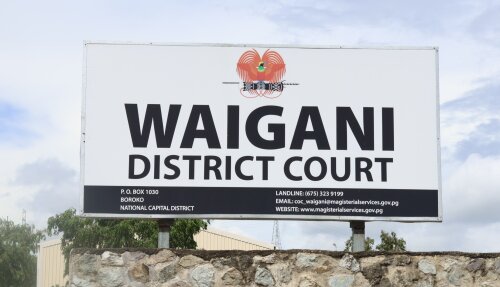Best Arrests & Searches Lawyers in Papua New Guinea
Share your needs with us, get contacted by law firms.
Free. Takes 2 min.
Or refine your search by selecting a city:
List of the best lawyers in Papua New Guinea
About Arrests & Searches Law in Papua New Guinea
Arrests and searches in Papua New Guinea are governed by a combination of statutory law, customary law, and principles derived from the Constitution of Papua New Guinea. The Criminal Code Act and the Constitution provide the foundational legal framework for handling arrests and searches to ensure the rights of individuals are protected. Law enforcement officers are granted certain powers to maintain order and enforce the law, but they are also required to respect and uphold individuals' rights during arrests and searches. Understanding these legal frameworks is essential for both law enforcement personnel and citizens.
Why You May Need a Lawyer
There are several situations where seeking legal advice concerning arrests and searches might be necessary:
- If you have been arrested and need to understand your rights and the process following your arrest.
- If you believe you have been unlawfully searched or that your rights have been violated during the process.
- If you are facing criminal charges and need representation in court.
- If you are seeking to challenge the legality of a search or seizure conducted by law enforcement.
- If you need assistance in filing a complaint against law enforcement for misconduct during an arrest or search.
Local Laws Overview
The key aspects of local laws relevant to arrests and searches in Papua New Guinea include:
- The Constitution: It provides protections against unlawful detention and ensures the right to be informed of reasons for arrest, as well as the right to legal counsel.
- The Criminal Code Act: This act outlines the procedures for lawful arrests, including the need for warrants in certain circumstances and the powers of police officers.
- Customary Law: In some cases, customary law may influence the interpretation and application of legal principles related to arrests and searches.
Frequently Asked Questions
1. What are my rights if I am arrested in Papua New Guinea?
If you are arrested, you have the right to be informed of the reason for your arrest, to remain silent, and to consult with a lawyer. You must also be brought before a court within a reasonable time.
2. Do the police need a warrant to search my home?
In most cases, the police need a warrant to search your home, unless there are exigent circumstances or consent is given.
3. Can I refuse a search?
Yes, you can refuse a search if the police do not have a warrant or other legal justification to conduct it. However, resisting forcefully without a valid reason might escalate the situation.
4. What happens during a police search?
During a search, the police may seize evidence pertinent to the investigation but are required to follow legal protocols to ensure the search is conducted lawfully.
5. Can I ask for a lawyer during police questioning?
Yes, you have the right to request a lawyer before or during any police questioning.
6. How long can I be held after being arrested?
The law requires that a person must be charged or released within a reasonable time, which varies depending on the circumstances but is typically within 24 to 48 hours.
7. What should I do if I believe my rights were violated?
You should document as much information as possible and contact a lawyer who can advise you on the steps to take, which might include filing a complaint or pursuing legal action.
8. Can the police search my vehicle without a warrant?
The police can search your vehicle without a warrant if they have reasonable suspicion of criminal activity or if there are visible signs of an offense.
9. Are there any limits to what the police can seize during a search?
Yes, the police can only seize items related to the offense being investigated unless they find evidence of other offenses during the search.
10. What can I do if I am being harassed by law enforcement?
You should report the incident to a higher police authority or an oversight body and seek legal assistance to address the harassment properly.
Additional Resources
For more information on arrests and searches, you may contact the following resources:
- Constitutional Law Reform Commission: Provides education and reform guidance on legal matters.
- Public Solicitor's Office: Offers free legal advice and representation for citizens who cannot afford private attorneys.
- RPNGC Internal Affairs Unit: Handles complaints and investigations into police misconduct.
- PNG Human Rights Commission: Addresses human rights concerns and violations, including those related to arrests and searches.
Next Steps
If you need legal assistance regarding arrests and searches in Papua New Guinea, consider the following steps:
- Consult with a qualified lawyer who specializes in criminal law and is familiar with the local legal landscape.
- Gather and document all relevant information and details related to your arrest or the search in question.
- Be prepared to articulate your concerns and the assistance you require when speaking with a lawyer.
- Utilize available resources such as legal aid organizations if financial constraints exist.
Engaging with a legal professional early can help ensure that your rights are protected and that you receive the guidance necessary for a favorable outcome.
Lawzana helps you find the best lawyers and law firms in Papua New Guinea through a curated and pre-screened list of qualified legal professionals. Our platform offers rankings and detailed profiles of attorneys and law firms, allowing you to compare based on practice areas, including Arrests & Searches, experience, and client feedback.
Each profile includes a description of the firm's areas of practice, client reviews, team members and partners, year of establishment, spoken languages, office locations, contact information, social media presence, and any published articles or resources. Most firms on our platform speak English and are experienced in both local and international legal matters.
Get a quote from top-rated law firms in Papua New Guinea — quickly, securely, and without unnecessary hassle.
Disclaimer:
The information provided on this page is for general informational purposes only and does not constitute legal advice. While we strive to ensure the accuracy and relevance of the content, legal information may change over time, and interpretations of the law can vary. You should always consult with a qualified legal professional for advice specific to your situation.
We disclaim all liability for actions taken or not taken based on the content of this page. If you believe any information is incorrect or outdated, please contact us, and we will review and update it where appropriate.
Browse arrests & searches law firms by city in Papua New Guinea
Refine your search by selecting a city.












